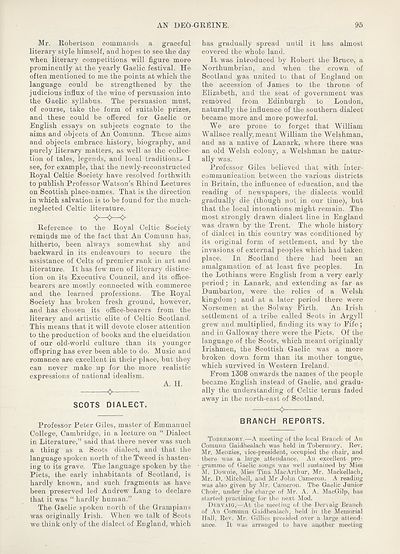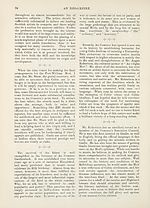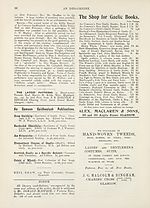An Comunn Gàidhealach Publications > Deo-gréine > Volume 17, October 1921 to September 1922
(103) Page 95
Download files
Complete book:
Individual page:
Thumbnail gallery: Grid view | List view

AN DE6-GREINE.
95
Mr. Robertson commands a graceful
literary style himself, and hopes to see the day
when literary competitions will figure more
prominently at the yearly Gaelic festival. He
often mentioned to me the points at which the
language could be strengthened by the
judicious influx of the wine of persuasion into
the Gaelic syllabus. The persuasion must,
of course, take the form of suitable prizes,
and these could be offered for Gaelic or
English essays on subjects cognate to the
aims and objects of An Comunn. These aims
and objects embrace history, biography, and
purely literary matters, as well as the collec¬
tion of tales, legends, and local traditions*. I
see, for example, that the newly-reconstructed
Royal Celtic Society have resolved forthwith
to publish Professor Watson’s Rhind Lectures
on Scottish place-names. That is the direction
in which salvation is to be found for the much-
neglected Celtic literature.
Reference to the Royal Celtic Society
reminds me of the fact that An Comunn has,
hitherto, been always somewhat shy and
backward in its endeavours to secure the
assistance of Celts of premier rank in art and
literature. It has few men of literary distinc¬
tion on its Executive Council, and its office¬
bearers are mostly connected with commerce
and the learned professions. The Royal
Society has broken fresh ground, however,
and has chosen its office-bearers from the
literary and artistic elite of Celtic Scotland.
This means that it will devote closer attention
to the production of books and the elucidation
of our old-world culture than its younger
offspring has ever been able to do. Music and
romance are excellent in their place, but they
can never make up for the more realistic
expressions of national idealism.
A. H.
o
SCOTS DIALECT.
Professor Peter Giles, master of Emmanuel
College, Cambridge, in a lecture on “ Dialect
in Literature,” said that there never was such
a thing as a Scots dialect, and that the
language spoken north of the Tweed is hasten¬
ing to its grave. The language spoken by the
Piets, the early inhabitants of Scotland, is
hardly known, and such fragments as have
been preserved led Andrew Lang to declare
that it was “ hardly human.”
The Gaelic spoken north of the Grampians
was originally Irish. When we talk of Scots
we think only of the dialect of England, which
has gradually spread until it has almost
covered the whole land.
It was introduced by Robert the Bruce, a
Northumbrian, and when the crown of
Scotland yas united to that of England on
the accession of James to the throne of
Elizabeth, and the seat of government was
removed from Edinburgh to London,
naturally the influence of the southern dialect
became more and more powerful.
We are prone to forget that William
Wallace really, meant William the Welshman,
and as a native of Lanark, where there was
an old Welsh colony, a Welshman he natur¬
ally was.
Professor Giles believed that with inter¬
communication between the various districts
in Britain, the influence of education, and the
reading of newspapers, the dialects would
gradually die (though not in our time), but
that the local intonations might remain. The
most strongly drawn dialect line in England
was drawn by the Trent. The whole history
of dialect in this country was conditioned by
its original form of settlement, and by the
invasions of external peoples which had taken
place. In Scotland there had been an
amalgamation of at least five peoples. In
the Lothians were English from a very early
period; in Lanark, and extending as far as
Dumbarton, were the relics of a Welsh
kingdom; and at a later period there were
Norsemen at the Solway Firth. An Irish
settlement of a tribe called Scots in Argyll
grew and multiplied, finding its way to Fife;
and in Galloway there were the Piets. Of the
language of the Scots, which meant originally
Irishmen, the Scottish Gaelic was a more
broken down form than its mother tongue,
which survived in Western Ireland.
From 1308 onwards the names of the people
became English instead of Gaelic, and gradu¬
ally the understanding of Celtic terms faded
away in the north-east of Scotland.
BRANCH REPORTS.
Tobermory.—A meeting of the local Branch of An
Comunn Gaidhealach was held in Tobermory. Rev.
Mr. Menzies, vice-president, occupied the chair, and
there was a large attendance. An excellent pro¬
gramme of Gaelic songs was well sustained by Miss
M. Downie, Miss Tina MacArthur, Mr. Mackellach,
Mr. D. 'Mitchell, and Mr John Cameron. A reading
was also given by Mr. Cameron. The Gaelic Junior
Choir, under the charge of Mr. A. A. MacGilp, has
started practising for the next Mod.
Dkrvaig,—At the meeting of the Dervaig Branch
of An Comunn Gaidhealach, held in the Memorial
Hall, Rev. Mr. Gillies presided over a large attend¬
ance. It was arranged to have another meeting
95
Mr. Robertson commands a graceful
literary style himself, and hopes to see the day
when literary competitions will figure more
prominently at the yearly Gaelic festival. He
often mentioned to me the points at which the
language could be strengthened by the
judicious influx of the wine of persuasion into
the Gaelic syllabus. The persuasion must,
of course, take the form of suitable prizes,
and these could be offered for Gaelic or
English essays on subjects cognate to the
aims and objects of An Comunn. These aims
and objects embrace history, biography, and
purely literary matters, as well as the collec¬
tion of tales, legends, and local traditions*. I
see, for example, that the newly-reconstructed
Royal Celtic Society have resolved forthwith
to publish Professor Watson’s Rhind Lectures
on Scottish place-names. That is the direction
in which salvation is to be found for the much-
neglected Celtic literature.
Reference to the Royal Celtic Society
reminds me of the fact that An Comunn has,
hitherto, been always somewhat shy and
backward in its endeavours to secure the
assistance of Celts of premier rank in art and
literature. It has few men of literary distinc¬
tion on its Executive Council, and its office¬
bearers are mostly connected with commerce
and the learned professions. The Royal
Society has broken fresh ground, however,
and has chosen its office-bearers from the
literary and artistic elite of Celtic Scotland.
This means that it will devote closer attention
to the production of books and the elucidation
of our old-world culture than its younger
offspring has ever been able to do. Music and
romance are excellent in their place, but they
can never make up for the more realistic
expressions of national idealism.
A. H.
o
SCOTS DIALECT.
Professor Peter Giles, master of Emmanuel
College, Cambridge, in a lecture on “ Dialect
in Literature,” said that there never was such
a thing as a Scots dialect, and that the
language spoken north of the Tweed is hasten¬
ing to its grave. The language spoken by the
Piets, the early inhabitants of Scotland, is
hardly known, and such fragments as have
been preserved led Andrew Lang to declare
that it was “ hardly human.”
The Gaelic spoken north of the Grampians
was originally Irish. When we talk of Scots
we think only of the dialect of England, which
has gradually spread until it has almost
covered the whole land.
It was introduced by Robert the Bruce, a
Northumbrian, and when the crown of
Scotland yas united to that of England on
the accession of James to the throne of
Elizabeth, and the seat of government was
removed from Edinburgh to London,
naturally the influence of the southern dialect
became more and more powerful.
We are prone to forget that William
Wallace really, meant William the Welshman,
and as a native of Lanark, where there was
an old Welsh colony, a Welshman he natur¬
ally was.
Professor Giles believed that with inter¬
communication between the various districts
in Britain, the influence of education, and the
reading of newspapers, the dialects would
gradually die (though not in our time), but
that the local intonations might remain. The
most strongly drawn dialect line in England
was drawn by the Trent. The whole history
of dialect in this country was conditioned by
its original form of settlement, and by the
invasions of external peoples which had taken
place. In Scotland there had been an
amalgamation of at least five peoples. In
the Lothians were English from a very early
period; in Lanark, and extending as far as
Dumbarton, were the relics of a Welsh
kingdom; and at a later period there were
Norsemen at the Solway Firth. An Irish
settlement of a tribe called Scots in Argyll
grew and multiplied, finding its way to Fife;
and in Galloway there were the Piets. Of the
language of the Scots, which meant originally
Irishmen, the Scottish Gaelic was a more
broken down form than its mother tongue,
which survived in Western Ireland.
From 1308 onwards the names of the people
became English instead of Gaelic, and gradu¬
ally the understanding of Celtic terms faded
away in the north-east of Scotland.
BRANCH REPORTS.
Tobermory.—A meeting of the local Branch of An
Comunn Gaidhealach was held in Tobermory. Rev.
Mr. Menzies, vice-president, occupied the chair, and
there was a large attendance. An excellent pro¬
gramme of Gaelic songs was well sustained by Miss
M. Downie, Miss Tina MacArthur, Mr. Mackellach,
Mr. D. 'Mitchell, and Mr John Cameron. A reading
was also given by Mr. Cameron. The Gaelic Junior
Choir, under the charge of Mr. A. A. MacGilp, has
started practising for the next Mod.
Dkrvaig,—At the meeting of the Dervaig Branch
of An Comunn Gaidhealach, held in the Memorial
Hall, Rev. Mr. Gillies presided over a large attend¬
ance. It was arranged to have another meeting
Set display mode to:
![]() Universal Viewer |
Universal Viewer | ![]() Mirador |
Large image | Transcription
Mirador |
Large image | Transcription
| An Comunn Gàidhealach > An Comunn Gàidhealach Publications > Deo-gréine > Volume 17, October 1921 to September 1922 > (103) Page 95 |
|---|
| Permanent URL | https://digital.nls.uk/127171209 |
|---|
| Description | Leabhar 17, Treasamh Mios an Fhoghair 1921 gu Dara Mìos an Fhoghair 1922 |
|---|---|
| Attribution and copyright: |
|
| Description | This contains items published by An Comunn, which are not specifically Mòd-related. It includes journals, annual reports and corporate documents, policy statements, educational resources and published plays and literature. It is arranged alphabetically by title. |
|---|
| Description | A collection of over 400 items published by An Comunn Gàidhealach, the organisation which promotes Gaelic language and culture and organises the Royal National Mòd. Dating from 1891 up to the present day, the collection includes journals and newspapers, annual reports, educational materials, national Mòd programmes, published Mòd literature and music. |
|---|---|
| Additional NLS resources: |
|

